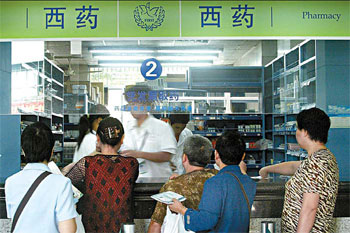Fighting the medical wolves in sheep's clothing
By Wang Ying (China Daily)Updated: 2007-04-27 09:27
Angels in white robes! That may be a tautology, but that's the image of doctors (and others in the medical profession) in China. In reality, however, they are far removed from their traditional portrait. The thirst for money has turned some of them into predators preying on patients. They still have the white robes on, though, making them look more like wolves in sheep's clothing (or the devil in angel's robes, if you will).
But are they alone to blame? Perhaps not! The hospitals and clinics they work for are equally, if not more, responsible for the mess.
|
People buy medicines at a hospital pharmacy in Ningbo, East China's Zhejiang Province. Many doctors prescribe unnecessary medicines to earn extra money from companies making them. |
Starved of funds, some hospitals and doctors today rely on hongbao red packets with kickbacks from patients and drug companies to fill their pockets. One such patient is Zhang Nan's wife. Zhang, a retired teacher in Nanjing, capital of East China's Jiangsu Province, had to give a $5,000 hongbao to doctors and nurses of a Shanghai hospital last year to ensure his wife got proper medical treatment. She was to undergo a brain surgery.
The money, sent home by Zhang's son who works abroad, was shared among "the doctor in charge, assistant doctors, the anesthesiologist and nurses", www.xinhuanet.com quoted the retired teacher as having said.
"My wife received better treatment and recovered very well because I gave the hongbao," he said, revealing that he learned the "trick" from an unpleasant experience. His niece didn't get proper medical treatment when doctors in Nanjing removed a stone from her gallbladder three years ago because they didn't get their expected hongbao, he said. That has left her with a long scar. They also prescribed a large number of unnecessary medicines. And her medical charges were 2,000 yuan ($260) more than that of patients who had given a hongbao of 1,000 yuan ($130) or more.
Though the health authorities have begun a campaign against unscrupulous medical workers, the problem is too deep to be rooted out quickly or easily. Ministry of Health (MOH) figures show that last year alone, doctors and nurses in the country charged more than 240 million yuan ($31 million) in kickbacks.
Also last year, supervision and discipline inspection departments at all levels in China began 2,535 bribery cases, involving 606 million yuan ($78.7 million), in the medical and pharmaceutical sectors, Beijing Youth Daily has reported.
The fear of losing a loved one forces relatives to offer gifts (read money) to doctors and nurses before an operation. Many doctors give patients the cold shoulder till they get their "money".
Unfortunately such shady deals are not confined to the medical and pharmaceutical circles. The education and agriculture sectors, too, have been attacked by this plague.
At a national meeting aimed at eliminating unhealthy industrial practices
earlier this month, officials pledged to eliminate this disease. Officials of
the State Council's office, however, said that this year they would focus on
building professional ethics in the medical sector, bringing down sky-high
medicine prices and regulating the healthcare market.
| 1 | 2 | 3 |  |
(For more biz stories, please visit Industry Updates)
